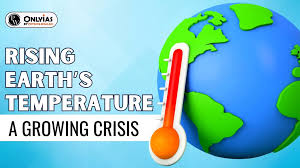
THE BEGINNING OF THE END Publish Date : 06/08/2025
THE BEGINNING OF THE END
Dr. R. S. Sengar and others
ARTH'S average temperature. E which had been constant over a long period because of the size and heat absorption capacity of the oceans, has increased to about 2 Fahrenheit (For 1° Celsius (C) since the pre-industrial era (1850-1900) due to the emission of Greenhouse Gases (GHC).
This may seem like a small number, but it has caused climate change, and the rate of global warming since 1981, is more than twice as fast, that is, about 0.32 F (0.18°C) per decade. It is the beginning of a different era. Scientists describe this as the Anthropocene Epoch, which in geological time is defined as the period when human activities have significant impacts on the Planet's climate and ecosystems.
Everything that we have done for human progress, increased well-being and wealth generation has breached the national as well as planetary boundaries. The rising global temperatures that cause a phenomenon known as climate change lead to a multinde of effects on Earth. Including more frequent and intense extreme weather events, rising sea levels and changes in ecosystems.
Significantly, climate change is a slow-moving crisis. To be more precise, it is a very fast-moving crisis from the perceptive of geological epochs, but very slow from the point of view of daily events and the political calendar. If the climate change crisis were going to culminate in a single event in a year, humanity would undoubtedly get itself organised to prevent or adapt to the crisis.
Yet the climate changes underway will play out over decades, not months Our situation is a bit like the proverbial frog that is put in water that is very slowly beated. The story bás it that a frog in gradually warming water will never jump out and will eventually be boiled alive. Pertaps humanity will be the same.
The changes witnessed year to year may be gradual to provoke large-scale actions, yet the cumulative effects could prove devastating, or we may wake up to the reality when it is simply too late to change the course decisively.
One of sour big problems is that we have evolved our quick reflexes. When a bear appears in front of our cave, we either fight or run. We do not sit there and say, "Now, what is the possibility of there being another bear outside? How often does this occur? Is this the new trend? Were there as many bears a decade ago as there are today?".
No, we usually do not evolve that way. We hardly use our slow reflex that we need to get scared, try to find the reasons thereof as well and define a possible way out to solve the problem.
The year 2024 was the warmest on record globally, with an average global temperature of 1.60°C above the pre-industrial average (1850-1900). According to the EU's Copernicus Climate Change Service (C3S), 2024 was the first calendar year with a global average temperature "clearly exceeding 1.5°C above the pre-industrial level; 11 months of the year saw the global average surface air temperature above the threshold."
The year 2024 has surpassed 2023 as the warmest year on record globally. The years have made the past decade (2015 to 2024), the warmest 10 years in the 175 year observational record. It indicates that global warming has remained unchecked.
Under the Paris Agreement in 2015, the world pledged to hold the rise in average temperature well below 2°C above pre-industrial levels and to mount efforts to limit warming to 1.5°C. The latter is the threshold beyond which climate change would worsen and its impacts become irreversible. An analysis of data from the European Centre for Medium-Range Weather Forecasts (ECMWF) which has been recording global temperatures since 1940, shows that the world has breached the 1.5°C threshold on 20 occasions or days during the entire year of 2023 and at least 279 occasions in the pu 63 years.
Crossing the threshold of individual months or years does not imply a rise in the planet's long-term global average
temperature.
However, the repeated crossings hring the planet closure to those critical barriers. If we look hack the interglacial period, which peaked around 125.000 years ago we also find evidence of warmer temperatures. The evidence suggests the long-term average temperature we pr no more than 1.5°C.
It is then mentioned that the orde high temperature in 2024 could have bem boosted by Nino and ENSO. But the alobalcimane records have been breached so frequently in 2024 thu none of them can serve an a benchmark. For consecutive 16 months since June 2025, the global emperature likely exceeded anything recorded before.
The unprecedented warming fucinl extreme weather even including heat waves, floods, typhoons, and wildfires, and including economics and societies worldwide.
In 2024, the world experienced a significamnaniber of natural disasters, with the Emergency EvemsDunibuse (EM-DAT) recording as many as 393 natural hararorem events that resulted in 16, 758 fatalities and affected million globally. Some of the most impacted disasters are mentioned below.
1. The western coast of Florida (USA) was hattered by one of the strongest Atlamicstornsthericane. Moon in September 2024. Around the same time, the strenge Hurricane Helene hit Florida's Big Bend region, come 250 Jesths and over 578 billion in damages.
2. Deamber 2024, imense tropical cyclone Chadobricatedshanyrows on the French island territory Medis. The cyclone was the strongest Mayonet 90 years.
3. In October November of 2024, in the sweeks, a catastrophic flood which has been dubbed as one of the deadliest disasters in decades, hit eastern and southeastern Spain and killed more than 200 people.
4. The Sahara Desert, one of the most arid landscapes on the planet, experienced an unexpected transformation following a powerful extratropical cyclone that swept through northwestern Africa on 7 & 8 September 2024.
5. India has seen more frequent and intense extreme weather events in 2024 compared to the previous two years. According to an assessment by the Delhi-based think tank Centre for Science and Environment (CSE) and Down To Earth (DTE). One of the devastating impacts was the massive landslides in Wayanad (Kerala) in July 2024. killing more than 200 people.
The rising global temperatures have a tremendous impact on our health. Higher temperatures lead to increased heat stroke, heat exhaustion, and cardiovascular problems among outdoor workers. Extreme heat events, like those experienced in many regions of the world, can cause premature deaths and exacerbate a wide range of existing health issues.
Warmer temperatures and changing rainfall patterns can expand the geographic range of disease vectors like mosquitoes, leading to increased transmission of diseases like malaria, dengue fever, and zika. Drought and changes in precipitation patterns lead to water shortage and affect water quality, increasing the risk of waterborne diseases. Climate change worsens air pollution from wildfires and industrial emissions, leading to respiratory problems and cardiovascular disease.
The World Meteorological Organization (WMO) reported that climate change added 41 days of dangerous heat in 2024, impacting human health and ecosystems. These impacts disproportionately affect vulnerable populations, and somestudies project that climate change could lead to 30 milli annual deaths by 2100. The "World Migration Report 2024" compiled by the Geneva-based International Organization for Migration points out that slow-onset events because of climate shatite cause displacements.
In 2024, the effects of global warming significantly influenced human migration patterns, imensifying both internal and cross-border displacement worldwide. The World Migration Report 2024 released by the UN estimates that over 216 million people across six continents could be compelled to move within their countries by 2050 Ques climate change.
Climate change has severe economic costs as it affects individual and household income, sectors of the co energy markets, innovation, and rising public debts, among other things. The climate change triggered by the relentles increase of global warming has potentially increased inflation and the debt-to-GDP ratio, resulting in economic uncertain and tighter fiscal and monetary policy.
As the old saying has it in "Tennessee, if you see a turile on top of a fence post, it is highly likely that it did not get there by itself.
And now we are seeing turtles on every tenth fence post in every field in the world. They did not get their own. It is now abundantly obvious that all the extreme temperatures and the extreme weather events associated with them are like turtles on a fence post. They did not happen without human interference in the climate as mentioned earlier.
It deserves mention that global warming and all other global environmental problems have a new character; the key aspect is the irrelevance of the national character of the problem. Consider some countries where they are burning fossil fuels. The CO, goes into the atmosphere. Does it stay over there? A CO, molecule does not know the political boundaries. It has not heard of a passport.
It has no brain. So it does not understand the idea of political sovereignty. lis just blown by the winds, moved by the general circulation of the planet. The planet is a unit. No one nation can solve the global warming vis-à-vis climate change problem alone. We are all in the Greenhouse together.
But as a trustee of the planet, we could hardly disown our duties. John F Kennedy once advised: "Ask not what your country can do for you, but what you can do for your country. For our purpose let us paraphrase it in this way "Ask not what our biosphere can do for us, but what we can do for our biosphere". To make our planet livable, each of us should adopt a responsible Earth ethic, such as accepting moral duty and obligation as a responsible citizen of the world to protect our biosphere.
We should subscribe to what Al Gore, the Nobel Peace Laureate, said: "I cannot stand the thought of leaving my children with a degraded earth and a dismissed future."

Writer: Professor R. S. Sengar, Director Training and Placement, Sardar Vallabhbhai Patel University of Agriculture and Technology, Modipuram, Meerut.


